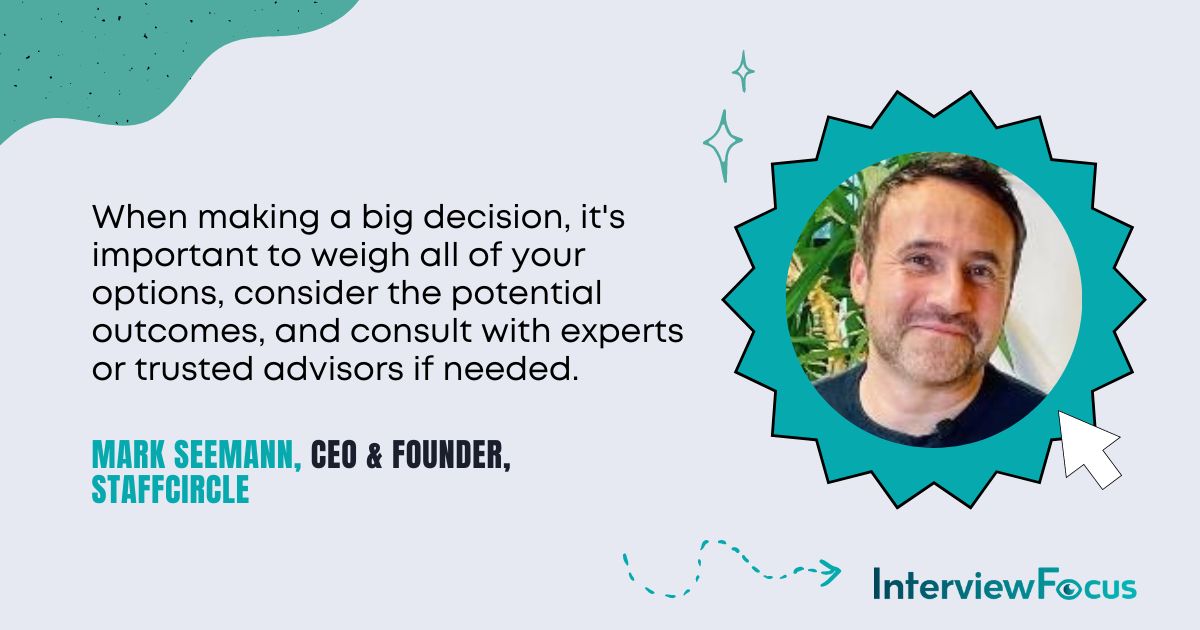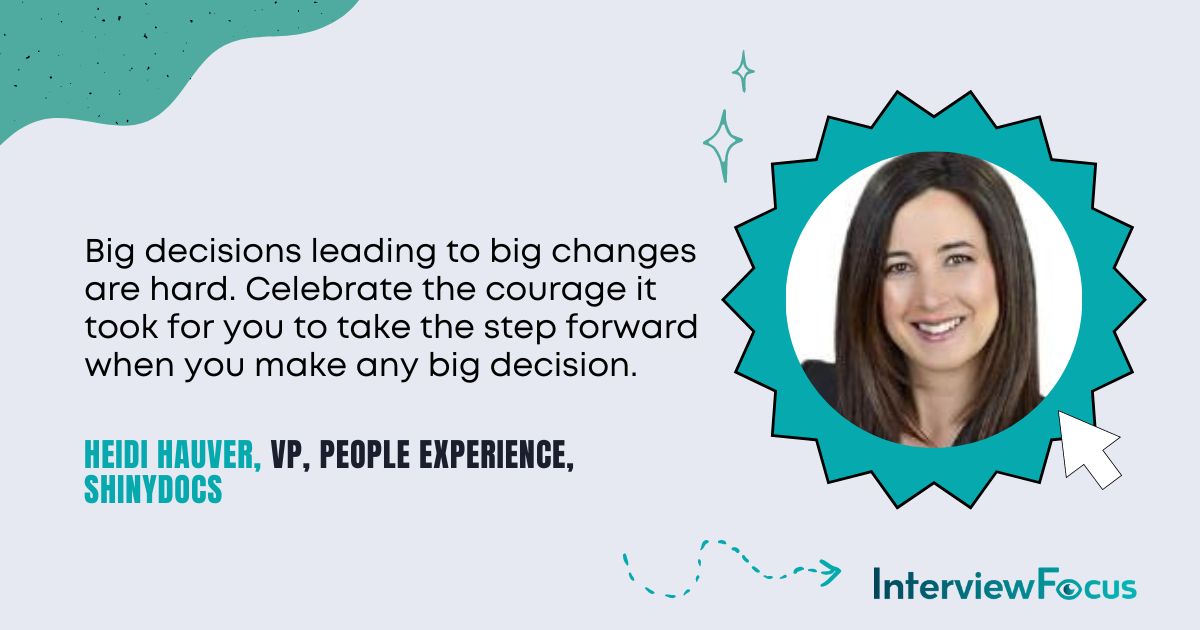From “What will you give up?” to “Will my decision affect other people?”, here are the 16 answers to the question, “What are some important questions to ask yourself when making a big decision?”
- What Am I Willing to Give Up?
- What Choice Would I Recommend to a Loved One?
- What Are the Possible Outcomes?
- Is It Irreversible?
- What’s the Worst-Case Outcome?
- In the Long Term, Will I Regret It?
- Is This Furthering My Long-Term Goals?
- Is My Gut Sunken or Confident?
- How Will This Impact the Future?
- Am I Following My Own Gut?
- If I Say Yes, Will This Make Me Happy?
- Is It Worth It?
- Is This What I Really Want?
- Does This Align With My Ethical/Moral Beliefs?
- How Am I Feeling Right Now?
- Will My Decision Affect Any Other People, and if Yes, How?
What Am I Willing to Give Up?
Making choices usually involves giving up other options, so you must ask yourself what you would be willing to give up. This is not to say that you cannot have it all, but you cannot always have it all at once. So, as you make choices in this particular moment, you need to identify what you would be willing to live without.
Maegan Griffin, Founder, CEO, & Nurse Practitioner, Skin Pharm
What Choice Would I Recommend to a Loved One?
This is a brilliant question to ask when making big decisions. It’s easy to focus on the short-term outcome of a decision and forget about the long-term ramifications.
By asking yourself what you would advise a family member or close friend to do in this situation, you can take into account both the short- and long-term effects of your decision. This question can help you take a more holistic view of the situation and make a more balanced decision.
Matthew Ramirez, CEO, Rephrasely
What are the Possible Outcomes?
When making a big decision, it’s important to weigh all of your options, consider the potential outcomes, and consult with experts or trusted advisors if needed. Taking the time to research and understand the implications of each option can help you make an informed decision that is best for you and those affected by it.
Additionally, it is important to be mindful of any potential biases or emotions that could influence your decision-making process. Once you have evaluated all the options, it is wise to have a plan for how to move forward with your decision and expect any potential risks or obstacles that may arise.
Mark Seemann, CEO & Founder, Staffcircle

Is It Irreversible?
I run a software company and I have to make a thousand little decisions and a few major decisions every week.
For us, speed is often more important than anything else. Delaying a decision can have many negative consequences, but so can deciding too fast without enough information.
Because of this, I ask myself if the decision can be reversed to discover if it was the wrong one.
In my experience, I realized that 90% of decisions are at least partially reversible. If we ship the code before it’s completely ready, just revert the changes. Stop working with the vendor if they don’t deliver. If we make the wrong hire, fire them sooner rather than later.
A small percentage of things are dire and irreversible. For those, we slow all the way down and take our time before deciding.
Daniel Ndukwu, CMO & Co-Founder, UsefulPDF
What’s the Worst-Case Outcome?
Making a big decision can seem like a risky move crashing your plane or taking it off the track for a high. Be ready for them, and they won’t come as a shock—they may not come at all; as a thrill-seeker, I’m always asking myself, “What’s the worst-case outcome?”
It keeps me motivated to explore fresh paths and push my limits with every big decision—there’s nothing like rising against a new challenge that promises growth!
So I go ahead—get curious about what lies before me even with the worst-case outcome and trust myself in taking thoughtful action with each decision!
Maria Harutyunyan, Co-Founder, Loopex Digital
In the Long Term, Will I Regret It?
Whenever you decide regarding your business, it’s easy to get wrapped up in the short-term consequences. When it really comes down to it, though, what separates good business people from average ones, is who can see the long game.
If you can put the short term into perspective and maintain the long view of your business, you’re no longer leaving your future up to chance. This is how you stay ahead of the game, how you beat people to the punch, and how you make sure your business thrives in the future.
What are the long-term consequences of the decision? That’s the biggest question you should ask yourself.
Tom Monson, Owner, Monson Lawn & Landscaping
Is This Furthering My Long-Term Goals?
The question I always ask myself when making a big decision is if saying “yes” to it will further my long-term goals.
We are all faced with many decisions every day, and some are enormous. Saying “yes” to one likely means saying “no” to another, so asking myself if saying “yes” will further my long-term goals keeps me from saying “yes” to things that seem easy, but get in the way of saying “yes” to things that will actually help me achieve what I want to achieve.
John Doherty, CEO & Founder, Credo
Is My Gut Sunken or Confident?
What does my gut say? Trusting my gut means listening to how I really feel about a decision. Those feelings, when considered carefully, can help guide you like a biological pro-con list.
A sunken feeling gives me a hint not to go through with something while feeling confident is a good sign. While, of course, there are other factors to consider, going with your gut can help you make a big decision.
Temoer Terry, Partner, Mommy Care Kit
How Will This Impact the Future?
How will this decision positively affect my life in the next five minutes, hours, days, weeks, months, and years?
If within that first five minutes you feel confident, have a sense of pride, and are at peace with your decision—kudos to you for making the right decision for you, right now. Make time to celebrate!
Within the first five minutes/hours and maybe even the first five days of making a big decision, if you still feel uncomfortable or wonder if you made the right call, remind yourself that it’s just a decision. You can (and will) make other decisions if this one doesn’t work out as planned.
Big decisions leading to big changes are hard. Celebrate the courage it took for you to take the step forward when you make any big decision. Focus on why making this decision was important for you, focus on your own journey (not the journey of others), and get excited about the potential of how this decision will affect the next five weeks, months, and years of your amazing life.
Heidi Hauver, VP, People Experience, Shinydocs

Am I Following My Own Gut?
Consultants are useful much of the time. Bringing in trusted sources with experience and insight is a smart move. But if you’re the one who is making the final decision, you have to follow your own instincts if you believe strongly that your way is the correct one.
If you cave to other people’s suggestions and those suggestions fail, you run the risk of losing the confidence of your team — but more importantly, also losing confidence in yourself.
One piece of advice one business leader said to me was, “Make your own mistakes.” With that advice, he was saying that I was sure to make mistakes. That’s because everyone makes mistakes, no matter how good they are. Just be sure those mistakes aren’t the result of you following someone else’s advice and not your own instincts.
Before you make any big decision, make sure you’re certain that it’s something you believe in. Don’t make a decision that someone else is fully invested in and you’re not – no matter how much you trust that person.
Emily Saunders, Chief Revenue Officer, eLuxury
If I Say Yes, Will This Make Me Happy?
If I say yes, will this make me happy? We make so many decisions through impulse moments or financial reasons. It’s important to take a step back and think about your happiness.
For example, if you’re looking to quit a job you hate for a position with a lower salary, will you be more satisfied? If the answer is yes, the decision has already been made.
Randee Machina, Director of Marketing, Simpli Pleasures
Is It Worth It?
Always ask yourself if it will be worth it when making important decisions. Rarely is the answer to this question a simple and specific yes or no.
However, the question allows you to reflect on the decision to be made and reconsider it. The question prompts you to look at what you will gain and may lose. Imagine a scale that weighs both decisions and tilts in favor of one of them. That’s how you can metaphorically describe the value of asking yourself if it’s worth it.
Think of this question as the last step, just before deciding itself. With the situation thought out beforehand, you may experience a strong feeling about which path you should take.
Nina Paczka, Community Manager, LiveCareer
Is This What I Really Want?
For many of us, the decision-making process is not a piece of cake, especially for BIG decisions. Reaching out for advice is not always the best idea, I believe.
First, ask yourself a question, “Is this what I really want?” Leave appropriateness behind. Forget about social expectations, your friends’ choices, etc. Be honest with yourself and don’t let others influence your decision. Be your own reference point, let’s say. With your strengths, experience, and beliefs.
Agata Szczepanek, Community Manager, LiveCareer
Does This Align With My Ethical/Moral Beliefs?
One thing to ask yourself when making a big decision is: does this align with my ethical and moral beliefs?
If there are things in your life that you believe in and are passionate about that this decision might affect, then you must take these factors into account. Big decisions are best made when they are considered alongside the most important things in our life. If something is going to directly affect your relationship with your family, a prior commitment you have made, and any beliefs you cling to your side, then these things should be considered.
We are only as good as the trust we have in ourselves and any nagging concern that we may have should be answered before making a big decision, and not after. I always ask myself about my personal beliefs and what I want during any decision-making process in order to stay true to myself.
Aaron Winston, Strategy Director, Express Legal Funding
How Am I Feeling Right Now?
The most important question that you should ask yourself before making any big decision is “how am I feeling right now?” The reason this is important is that you can make poor decisions when you feel negative. In this state, your judgment and ability to look at things from the correct perspective will be clouded.
Often, big decisions are the least intuitive and least straightforward and may require you to look at the bigger picture. These kinds of decisions need to be made when you are not under stress or pressure or when you are blinded by anger or negative feelings and thoughts.
This is easier said than done, but you should always ask yourself if you are making this decision as a reaction to negativity and stress. You should only make important decisions in a calm and clear manner when your brain is alert and open to positive and creative influence.
So be sure to wait until you are in a better and more conducive mood that will help you make the best decision for you.
Karl Perera, Astrophotographer & English Teacher, Help Universal Ltd
Will My Decision Affect Any Other People, and if Yes, How?
If the decision will just impact me, my level of embarrassment, or my ending up dissatisfied with something, I generally put less thought into it.
Don’t be mistaken, though, it’s not just altruism or lack of self-love. These smaller decisions are important, but simply not as vital as decisions that impact other people.
Each day as Chief Operations Officer, I have to make decisions that will affect employees, partners, and customers in various ways. Sometimes I’m forced to pick a “lesser evil.” That’s why it’s good to be fully aware of how my decision will affect other people first.
This type of accountability and responsibility for others is crucial because you can deal with your own emotions and feelings that are consequences of your decisions at your own pace. But don’t force people to deal with problems you caused.
Athina Zisi, Chief Operations Officer, Energy Casino






